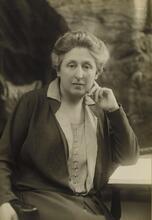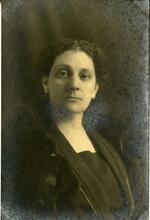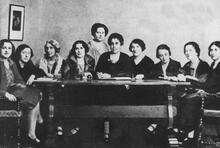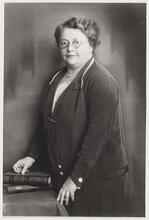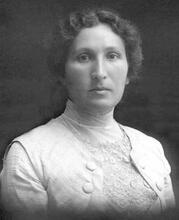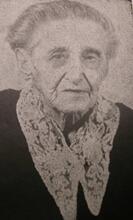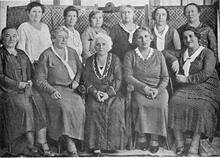Jenny Apolant
Feminist activist and suffragist Jenny Apolant started her career in 1907 with the establishment of the Center and Information Center for Women’s Community Services in Frankfurt. She later served as a board member of the General Association of German Women and was one of the first women municipal councilors in Frankfurt. In 1922 she established the Political Workers Association, the aim of which was above all to educate women politically. Like others of her generation, she was a woman of conviction who did not hesitate to defy convention and tradition, and who realized that only profound social change could permanently improve the condition of women.
Article
Feminist activist Jenny Apolant was born on November 5, 1874, in Berlin, where she grew up together with her brother, Walter Rathenau (1867–1922). Their father, Emil Rathenau (1838–1915), an industrialist and engineer who founded the A.E.G. electric corporation, was also born in Berlin and was married to Mathilde (née Nachman). In 1905 Jenny moved to Frankfurt am Main, where her husband, Professor Hugo Apolant (1866–1915), served as a cancer researcher at the Institutes for Experimental Therapy. In 1907 she took on the establishment and management of the Center and Information Center for Women’s Community Services, which had been initiated by the General Association of German Women (Allgemeinen Deutschen Frauenverein). In this position she authored numerous evaluations, statistics, and informational writings. Her study on the status and involvement of women in the community, a “convenient work of reference,” provided detailed information on women’s participation in communal social work in the cities and individual states of Germany. The study demonstrated the extent of this participation, which had been initiated in 1868 and become widespread since 1896.
An ardent suffragist, Apolant served as a board member of the General Association from 1910 to 1925. In Frankfurt, where she was from 1919 to 1924 one of the first women municipal councilors, representing the Democrats, she initiated innovative institutions such as care for sick people, alcohol-free popular restaurants and, during the inflation, a central location for the sale of privately-owned valuables, a Sick Fund and winter aid. These served as models for other large communities. In 1922 she established the Political Workers Association, the aim of which was above all to educate women politically. Like others of her generation, she was a woman of conviction who did not hesitate to defy convention and tradition, and who realized that only profound social change could permanently improve the condition of women.
In his memoir (1982), Rabbi Georg Salzberger of Frankfurt refers to “the charming Jenny Apolant, founder of hospital care” as one of the significant women in his community. Apolant, who was a member of the Central Union of German Citizens of the Jewish Faith, described her connection to Judaism as follows: “I possess the best a human being can have. I am German and I am a Jew.” This was also the opinion of Dorothea von Elsen, president of the Association of German Women: “German cultural life, with which she was intimately involved, her fatherland and love of communal life existed in total harmony with the proud and austere faith of her ancestors.”
Selected Works
Das kommunale Wahlrecht der Frauen in den deutschen Bundesstaaten. Berlin: Teubner, 1918.
Stellung und Mitarbeit der Frau in der Gemeinde. Berlin: B.C. Teubner, 1910.
Jüdische Frauen im 19. Und 20. Jahrhundret: Lexikon zu Leben und Werk. Edited by Jutta Dick and Marina Sassenberg. Rowohlt, Reinbek, 1993.

